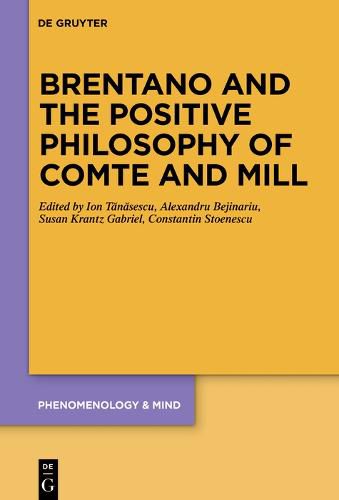Readings Newsletter
Become a Readings Member to make your shopping experience even easier.
Sign in or sign up for free!
You’re not far away from qualifying for FREE standard shipping within Australia
You’ve qualified for FREE standard shipping within Australia
The cart is loading…






This title is printed to order. This book may have been self-published. If so, we cannot guarantee the quality of the content. In the main most books will have gone through the editing process however some may not. We therefore suggest that you be aware of this before ordering this book. If in doubt check either the author or publisher’s details as we are unable to accept any returns unless they are faulty. Please contact us if you have any questions.
Before now, there has been no comprehensive analysis of the multiple relations between A. Comte’s and J.S. Mill’s positive philosophy and Franz Brentano’s work. The present volume aims to fill this gap and to identify Brentano’s position in the context of the positive philosophy of the 19th century by analyzing the following themes: the concept of positive knowledge; philosophy and empirical, genetic and descriptive psychology as sciences in Brentano, Comte and Mill; the strategies for the rebirth of philosophy in these three authors; the theory of the ascending stages of thought, of their decline, of the intentionality in Comte and Brentano; the reception of Comte’s positivism in Whewell and Mill; induction and phenomenalism in Brentano, Mill and Bain; the problem of the I in Hume and Brentano; mathematics as a foundational science in Brentano, Kant and Mill; Brentano’s critique of Mach’s positivism; the concept of positive science in Brentano’s metaphysics and in Husserl’s early phenomenology; the reception of Brentano’s psychology in Twardowski; The Brentano Institute at Oxford. The volume also contains the translation of the most significant writings of Brentano regarding philosophy as science.
I. Tanasescu, Romanian Academy; A. Bejinariu, Romanian Society of Phenomenology; S. Krantz Gabriel, Saint Anselm College; C. Stoenescu, University of Bucharest.
$9.00 standard shipping within Australia
FREE standard shipping within Australia for orders over $100.00
Express & International shipping calculated at checkout
This title is printed to order. This book may have been self-published. If so, we cannot guarantee the quality of the content. In the main most books will have gone through the editing process however some may not. We therefore suggest that you be aware of this before ordering this book. If in doubt check either the author or publisher’s details as we are unable to accept any returns unless they are faulty. Please contact us if you have any questions.
Before now, there has been no comprehensive analysis of the multiple relations between A. Comte’s and J.S. Mill’s positive philosophy and Franz Brentano’s work. The present volume aims to fill this gap and to identify Brentano’s position in the context of the positive philosophy of the 19th century by analyzing the following themes: the concept of positive knowledge; philosophy and empirical, genetic and descriptive psychology as sciences in Brentano, Comte and Mill; the strategies for the rebirth of philosophy in these three authors; the theory of the ascending stages of thought, of their decline, of the intentionality in Comte and Brentano; the reception of Comte’s positivism in Whewell and Mill; induction and phenomenalism in Brentano, Mill and Bain; the problem of the I in Hume and Brentano; mathematics as a foundational science in Brentano, Kant and Mill; Brentano’s critique of Mach’s positivism; the concept of positive science in Brentano’s metaphysics and in Husserl’s early phenomenology; the reception of Brentano’s psychology in Twardowski; The Brentano Institute at Oxford. The volume also contains the translation of the most significant writings of Brentano regarding philosophy as science.
I. Tanasescu, Romanian Academy; A. Bejinariu, Romanian Society of Phenomenology; S. Krantz Gabriel, Saint Anselm College; C. Stoenescu, University of Bucharest.